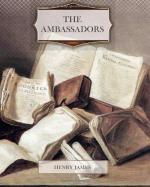|
This section contains 3,939 words (approx. 10 pages at 400 words per page) |

|
In the following essay, Krook examines how James' use of ambiguity in The Ambassadors leaves the reader with two separate interpretations of the text from which to choose.
There is scarcely a page in Henry James's The Ambassadors (1903) that is not ambiguous in the common loose sense of the word, in which 'ambiguous' means simply obscure, puzzling, mystifying, baffling, and the like. This passage or this sentence could mean this, or that, or something else, we say to ourselves as we gaze at it, often blankly, trying to make out what it could reasonably mean. Here is a typical example. It is the last passage in a long colloquy between Strether and Maria Gostrey late in the story, ending the chapter (Book XI, Chapter 2) which is immediately followed by Strether's fateful day in the French countryside (Book XI, Chapter 3). Maria says:
'Mr. Newsome and Madame de Vionnet...
|
This section contains 3,939 words (approx. 10 pages at 400 words per page) |

|




